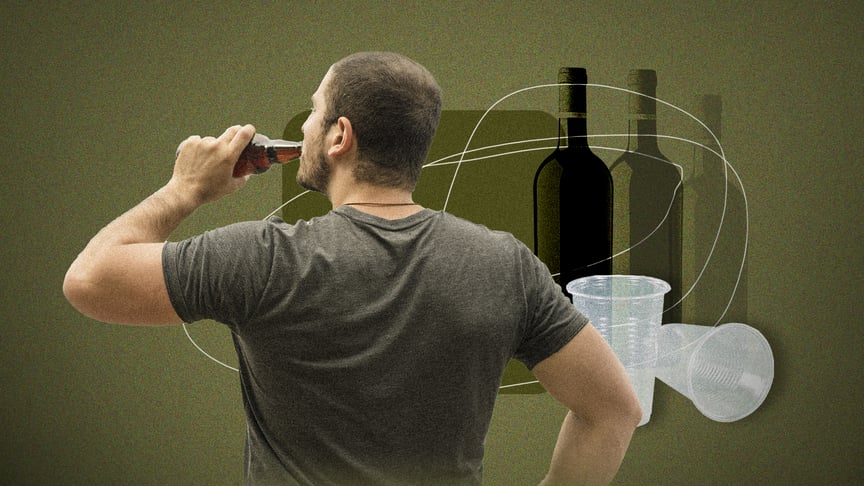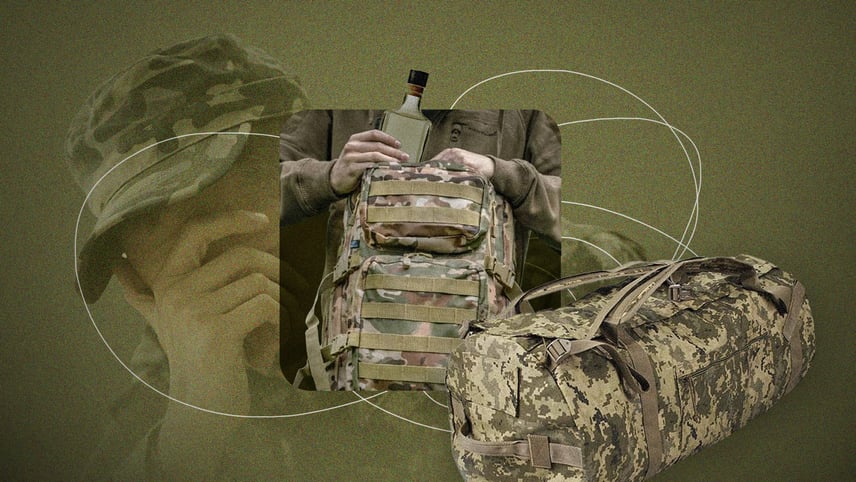"Drinks as long as there's something to drink": How the Ukrainian Armed Forces are tackling alcohol addiction.

The Difference Between "Having a Drink" and "Getting Drunk"
Some may find it a good idea to compel a subordinate to memorize the fourth article of the Disciplinary Charter of the Armed Forces of Ukraine, which prohibits “consuming alcohol while on duty.”
“If he wants to have a drink, he disregards the Charter, the commander, his comrades, and the combat mission,” says the company commander Dmitry.
According to him, it is unrealistic to prevent alcohol from reaching the position. The commander lacks the time and ability to sniff out every bottle labeled as mineral water.
“There was a situation: I sent a trusted, reliable person for supplies. He once brought packages from the post office for the guys. There were no bottles of alcohol. Yet the guys got drunk. I checked their mineral water — and it turned out to be homemade vodka that burned no worse than machine oil.”
“Another case: an entire position got drunk, three men. I heard them talking on the radio and realized they needed to be extracted. I had to retrieve them under fire from that position and send in other soldiers. There was a time when, instead of the drunkard, I sent another soldier to the position — and he died. Of course, it wasn’t the drunkard who killed him, but the guy died because of him,” Dmitry recounts.
At the same time, he does not consider alcohol to be an absolute evil.
“I believe that about 50 grams, just to sleep peacefully, is taken by up to 70% of the personnel. But drinking varies. One person drinks, sleeps well — and is ready to tackle any task in the morning. Another can’t even get up without 100 grams. Those are the ones we have issues with. They drink as long as there’s something to drink, and there’s always something,” explains the company commander.
The chief sergeant of the 93rd brigade, Oleg, believes that a person who did not abuse alcohol before mobilization will not become an alcoholic in the army. According to his observations, up to 80% of army drunks are those who drank regularly in civilian life.
Yes, a person can get drunk once — out of fear, after a heavy battle, from immense stress when they lose a comrade. But that would be to relax quickly.
“There were many cases when guys got drunk after what they experienced. I was the same. Once, near Bakhmut, when we finally reached our own, we drank for two or three days. I allowed the guys to drink and joined them. Everything was without excesses. Then I said: that’s it, today I won’t bother you, but don’t pour anymore, and tomorrow everyone should be in top shape. Clearly, some didn’t listen to me and kept pouring, but in the morning, everyone was fine,” Oleg shares.
“How can a commander who allows drinking today and drinks with everyone punish for drinking tomorrow? What’s the logic in that?” I ask.
“Life’s logic,” he replies.
The chief sergeant is convinced that responsible individuals, especially with a respected commander, will always know when to stop and not cross the line beyond which alcohol chaos begins in the unit.
“The authority of the commander is very important. And, of course, the quality of the personnel matters. If the team is morally resilient, it will help the commander deal with drunks. But, honestly, if during the formation of the unit you throw in two or three alcoholics, even a good team will find it difficult,” says Oleg.
Regarding the effectiveness of a commander’s authority, officer of the 47th brigade Igor shared this story: “I had a soldier, very brave, worth ten in battle. He got drunk once, then another time. I put him in a cold basement, waited for him to sober up, then sent him on a mission. After the mission, I talked to him. After that, he stopped drinking altogether.”

Fines, Agreements, and "A Hit Between the Eyes"
As our interlocutors say, the commander has two ways to influence a persistent drunkard — legal and... another.
For instance, the drunkard is persuaded by the commander and personnel psychological support specialists. They have heartfelt conversations with him, write letters to his wife, parents, and even the community — saying, your husband or fellow citizen regularly violates, gets drunk, ignores, etc.
“Sometimes, just the threat of telling his wife about all his antics works on a person — and he stops drinking. But more often than not, these educational moments go unnoticed by the drunkard,” says officer of the 47th brigade Igor.
According to Oleg, chief sergeant of the 93rd brigade, one method of persuading a drunkard may be an agreement, like “I’m treating you like a normal man”: if you want to drink, do it between shifts and quietly sleep. But don’t you dare drink on the position.
However, such agreements only partially work. It’s hard for a drunkard to understand why the commander who allows drinking today forbids it tomorrow.
If persuasion fails, the drunkard is handed over to the Military Law Enforcement Service.
“There, they check his blood alcohol level. Appropriate protocols are drawn up. If he’s drunk, it means he committed an administrative offense. A financial penalty is imposed for that. For the first violation, it’s a deduction of 17,000 hryvnias from salary. If he falls into the Military Law Enforcement Service again, it could mean confinement and a deduction of 100,000 in combat bonuses. For many, this is a very effective measure, as the family is left without means,” Oleg explains.
But for some, this measure is like a dead man’s comfort. They continue to drink anyway. Then the commander resorts to other means of influence.
“If he gets drunk on the position and hinders the completion of tasks, he needs to be subdued — tied up and hit between the eyes,” Oleg decisively recommends.
However, one must agree that there is a very small distance between this “between the eyes” and the arbitrariness that thrived in the 211th brigade.
In response, company commander Dmitry notes: “What was done in the 211th was excessive. But often drunks become very aggressive. There are many cases in the Armed Forces of Ukraine that, for obvious reasons, are not made public: when a drunk grabs a weapon and harms his own. And his own were supposed to shoot him.”
According to officer Igor of the 47th brigade, applying physical force to a drunkard is an extreme measure, but sometimes it’s the only viable and correct one.
“Articles 21 and 22 of the Internal Service Charter of the Armed Forces of Ukraine state that physical force and weapons may be used against a soldier if other measures of influence have proven ineffective; particularly when such a soldier poses a threat to the life and health of personnel. If, for instance, it’s necessary to forcibly put him in a vehicle to send him to the Military Law Enforcement Service, physical force should be applied to calm him down and transport him to the law enforcement service,” he states.
Thus, physical force in certain cases does not contradict the law.
“Other” Means
The situation becomes even more complicated when it involves extortion.
“It varies. The commander might say: either you go to the Military Law Enforcement Service, or give money for the material support of the unit. After all, there’s never enough money for equipment repairs and the purchase of various supplies,” says Igor from the 47th brigade.
“But how do you avoid the abuse of the commander's position in such cases? And the schemes from the subordinate’s side: get drunk — pay — feel no remorse? This is such a temptation for everyone,” I say to the officer.
“In this case, separating from the abuse is indeed difficult. It all falls on the commander’s responsibility. If the unit has a healthy atmosphere, the money is definitely going to the unit, and the drunkard is genuinely corrected by this means, then I believe it’s an acceptable practice. Although it’s not legally sanctioned. Personally, in my unit, I practice this Military Law Enforcement Service,” the officer states.
From money for the unit to money directly for the commander to turn a blind eye to a subordinate’s drunkenness — it’s just one step. And it can be taken very quickly.
“This is the commander’s problem. Because he takes the money